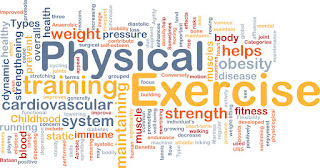How does physical activity improve our physical and mental health?
The function of physical activity has grown to become very important in our life, not only because of aesthetic reasons but also because of its benefits on our physical and mental wellbeing. Such growing awareness has initiated individuals to become more health conscious and encompass exercise as part of their daily health regime.
Individuals engaging in physical activity have shown to demonstrate positive health outcomes across a variety of conditions including obesity, cancer, cardiovascular disease, arthritis, sexual dysfunction and others. In fact, "consequences of physical inactivity (e.g. obesity, diabetes) are related to both cancer incidence and mortality in various cancer (e.g. breast, endometrial) populations" (Magnusson, Baron, Persson, et al., 1998).
Obesity is the result of both a sedentary lifestyle as well as the lack of knowledge that the person has towards nutrition and its importance as a part of maintaining a well-balanced diet. Obesity does not only adversely affect the physical status of the individual but also a major contributing factor towards the development of medical conditions. In fact, physical inactivity related to obesity has shown to double the prevalence of health risks and increase drastically the proneness to various diseases that will ultimately lead to a shorter lifespan.
It is of great importance that we do not only modify our food intake but combine this modification with exercise. Studies concerning cancer survivors indicate that the "benefits of physical activity may surpass modifications in diet" (Penedo & Dahn, 2005), implying the significance of exercise over certain dietary changes. Results show that cancer survivors who perform some form of physical activity have reported reduced fatigue, elevated moods, improved physical functioning and reduced physical-role limitations.
Individuals suffering from cardiovascular diseases can improve well-being and decrease the risks of adverse recurrent cardiovascular incidents by introducing physical activity as part of their lifestyle.
Arthritis patients practising exercise displayed “significant improvements in physical function and reductions in the perception of pain” (Penedo & Dahn, 2005). This study, therefore, highlights the importance that physical activity has on both motor and cognitive skills.
In relation to erectile dysfunction, studies have shown that male subjects performing regular physical activity have reported a reduced risk of developing such physiological condition. On the contrary, physically-inactive individuals had a higher risk of developing erectile dysfunction and negative valence.
In addition to the benefits that physical activity has on the body's physical well-being, studies highlight how physical activity improves a person's state of emotional wellbeing. In fact, these studies show that exercise “improves mood and reduces symptoms of depression and anxiety” (Ross & Haynes, 1988). Consistency in physical activity may therefore prevent the onset of mental illnesses such as depression and instil positive emotions. Furthermore, higher levels of physical activity may also correlate to a better cognitive performance that lacks from stress, confusion and anger.
In essence, it is vital that as humans we not only perform physical activity and maintain a balanced diet because its a must, but more importantly such lifestyle is adapted consciously and voluntarily where the fruit of such lifestyle will eventually be seen by time.
Read more on this topic at https://journals.lww.com/co-psychiatry/Fulltext/2005/03000/Exercise_and_well_being__a_review_of_mental_and.13.aspx




Comments
Post a Comment